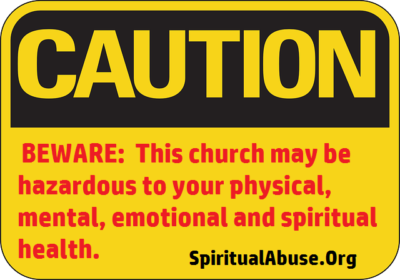In two groups, I asked people to share how they were harmed during their time in the United Pentecostal Church. People were also able to respond who exited a different group. I received enough responses to make at least five blogs. These are used by permission and are anonymous. Some responses have been edited for spelling and punctuation. The ones included in this part were from the UPCI or other Oneness Pentecostal group as well as one other group. Each person is separated between using and not using quotations. After reading this series of posts, perhaps many will better understand some of what can happen to people in abusive churches. See Part One and Part Two.
I was harmed by the usual stuff that people have noted here, minus the sexual abuse (that came earlier in life, before the church). I think though, that the worst thing for me is the niggling thought that the problems I have now are my fault from leaving church.
Psychologically scarred, for one. I’m 11 years on the outside now and just completed a several month round of therapy that was much needed after some UPC trauma started to rise from beneath the surface. This kind of trauma subliminally affects us and even if we think we’re entirely over it, down the road it will show up. And we have to confront it, deal with it. My problem was that I couldn’t trust my judgment or instincts – I felt like I was crippled when facing major decisions. That is because the UPC teachings paralyzed that part of my brain for so long. They taught me I cannot make my own decisions. So I’m much better after this last round of therapy and feeling confident in myself.
Another way – in my last UPC church (the big Denver one), I was used to the last drop for my musical talents from 16 to almost 20. I counted that I was probably playing piano there upwards of 10 hours a week, with Sunday morning and night, Tuesday night choir practice, Wednesday night church, and Friday youth service. It stole many years from me, physically and spiritually and emotionally exhausted me, and caused me to miss so many experiences most teens would have had.
It made me feel like I was living a double life and sinning because I went to a movie or wore shorts or any other silly thing they were against. It also warped my mind to judge someone’s heart on the basis of their outward experience.
Because God always makes lemonade out of lemons if we’ll allow Him to, that experience taught me to study, research, learn, and never take any belief for granted or as Gospel truth without investigating it myself.
I was told that if I listened to her (a fellow church member) she could save me money on therapy…I was told to stop my medicine…rely on God and get in my word, give it all to God, pray, etc etc…I stopped my medicine believing that I was spiritually lacking and wanting a way out of the madness that was my mind. Ended up suicidal, was taken to the ER and was baker acted into a mental hospital for about three weeks. After that while attempting to pray at the altar, she comes to me and says that she can’t pray with me anymore because I won’t respond to the leading of the Spirit and there are others who want a move of God and will receive it… I figured if I started crying and jumping then she would think I was praying through…I wasn’t about all that…I soon realized I was better off if she left me alone.
The cult I joined was not UPC or any oneness group. You could probably call it Pentecostal because there was HUGE emphasis on the Holy Spirit. They followed the so-called five-fold-ministry structure. However, they were independent and not part of any denomination or other large organization.
How was I harmed? I could write a book about that.
Simply put, it destroyed my ability to trust, either other human beings or even God. I have rebuilt some of that trust, and in a much more healthy way, but I am still a very deeply suspicious person now. On the positive side, because I make people prove their trustworthiness, it makes spotting cons and fakes easier.
It destroyed my ability to trust God because I thought I was following his will, thought he had worked wonders through them, and then had my life torn apart by these same people claiming to work in his name. As I told my therapist just this last week, if these people were harming others in his name, using his words in the Bible and targeting people he claims to love and that STILL wasn’t enough to get him to intervene, how could I ever trust him? The truly sad part is I want to be able to trust him, but I am going to need him to prove that he is trustworthy. Trust is earned, not owed.
It is almost impossible to read the bible, both because of the sick and twisted teachings the group had applied to various verses as well as the fact they made Bible reading such a chore.
I lost a woman who I could have married. I met her at the church I attended before. We were dating before I ever joined the group, and for awhile after that. However, she began to see some of the unhealthy aspects and decided to get out. I had a bad rebound relationship and then after that the group became very controlling of who we could date (basically no one from outside). So I spent years literally having no opportunity to date. Now that I am out, I am in my 30’s and the “dating pool” is more a stale, septic puddle. So they robbed me of companionship.
I lost friends. Friends who never joined and were either driven away by my own increased toxicity at the time, or were cut off by the increasingly isolationist policies. Even worse were friends who had joined, and were twisted into someone else by the elders’ control. After I and a few others left, those once so-called friends shunned us, not that I would trust them anymore anyway.
What I believe has been undergoing a massive change since I left. It took a while, and even when I started I didn’t know what I was actually doing yet, but basically I have taken everything I once believed, both from the group and from my time before, taken it “out of myself” and set it on a metaphorical table. I have stripped these beliefs apart to as small of pieces as possible, and have been carefully and painstakingly examining them bit by bit. Discarding ones that are demonstrably false, reintegrating those that demonstrably have truth, and continuing to examine the rest. There are many that have been discarded, a few that have been taken back in… and quite a few that remain on that table.
Let me count the ways….
As an adult head of my household, I was not allowed to have church friends over to my house without the pastor’s permission. He refused to allow it because he said it was “dividing the baby” (a reference to Solomon). Because the people invited were of one ethnicity and I hadn’t included the pastor or his daughter, it meant I was “causing division.” Truthfully, that was the furthest thing from my mind. I simply wanted to hang out with people I had something in common with, share a meal, and relax. Instead of coming to me privately to address the issue, he preached a whole sermon about it on Sunday morning from the pulpit. That’s when I left.
Pastor would publicly berate and shame teens for riding their bikes to the library and hanging out at the library. He publicly told church people if they saw teens (by name) there, to send them home and report it to him. Supposedly they were hanging out with “worldly teens” there.
As young mothers, no matter what type of feeding, we were not allowed to feed our infants in the auditorium, because a drop of something might leak on church upholstery. Yet there was no nursery. So, to feed the babies, we had to go into the ladies bathroom and sit on the floor because there was only one chair in there and lots of young babies. Needless to say, between fussy, tired babies, feedings, and diaper changes, we’d usually all end up sitting on the bathroom floor for the better part of those 1-1 1/2 hour sermons.
Mine was letting go and the fear was overwhelming. I still feel like a misfit but I am on the mend. When I go to a different church and not UPC, I hear my pastors voice that I am wasting my time.
********
Shop at our Amazon store! As an Amazon Influencer, this website earns from qualifying purchases.





